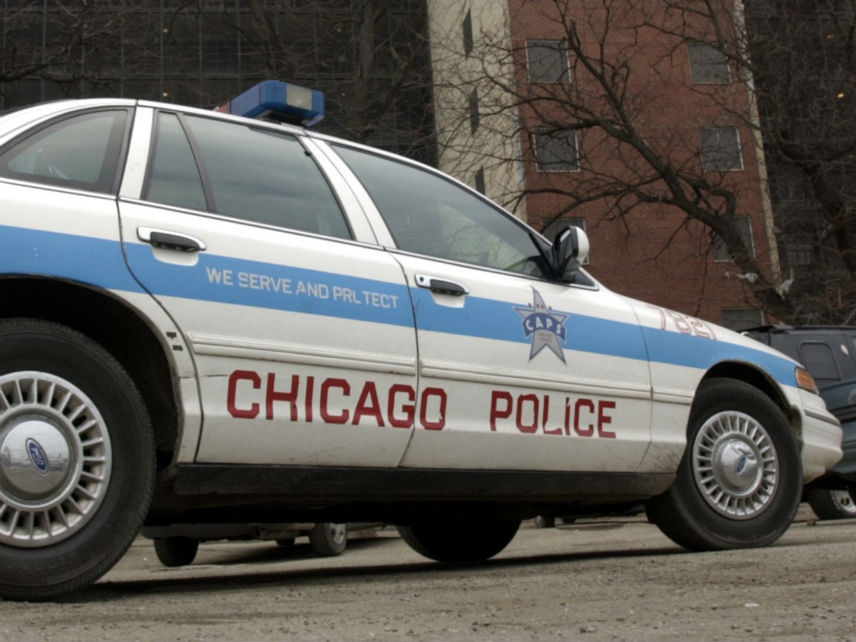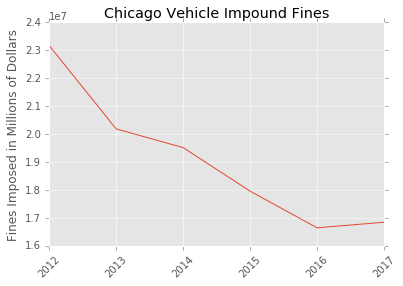Chicago Has Raked in $114 Million in Vehicle Impound Fines Since 2012
- OurStudio

- Jun 28, 2018
- 3 min read

Terrence Antonio James/TNS/Newscom
Chicago has slapped motorists with more than $100 million in vehicle impound fines since 2012 under a program that community activists and civil liberties groups say leaves poor defendants bereft of their cars and buried in debt.
Between 2012 and 2017, Chicago imposed $114 million in fines in more than 108,000 impound cases, according to records from Chicago's vehicle impound database obtained by Reason. Roughly $36 million of that money was collected based on drug violations.
In April, Reason published an investigation into Chicago's vehicle impound program, detailing how the uniquely punitive system is used to generate revenue for the cash-strapped city, often on the backs of people who can't afford it:
The city says it is simply enforcing nuisance laws and cracking down on scofflaws. But community activists and civil liberties groups say the laws are predatory, burying guilty and innocent owners alike in debt, regardless of their ability to pay or the effect losing a vehicle will have on their lives. "There's plenty of reason to be concerned that there's injustice being done to people who are mostly poor, people who aren't in a position to fight back," says Ben Ruddell, a staff attorney at the American Civil Liberties Union (ACLU) of Illinois. "The city has been perpetuating an exploitative system, charging exorbitant fees in a way that it knows is likely to make it so folks never get their cars out of impoundment."
The story highlighted the case of Spencer Byrd, a man from Harvey, Illinois, who had been fighting for nearly two years to get his Cadillac DeVille back after the Chicago Police Department impounded it. Byrd was a self-employed auto mechanic, and he said he was giving a client a ride home after a service call when the police pulled him over and discovered heroin in the passenger's pocket. Even after an Illinois judge ordered Byrd's car released to him while his state asset forfeiture case was pending, finding he faced substantial financial hardship, the city refused to give it up it until Byrd paid off fines and fees he owed the city.
Although Byrd won the state forfeiture case, a Chicago administrative judge ruled that he was still liable under the city's municipal code, which only requires a preponderance of evidence to establish guilt, does not give property owners a right to an attorney, and does not allow an "innocent owner" defense in impound cases. Even if a vehicle's owner is not aware of a violation, as when a teenager borrows his parents' car, the owner is still liable for thousands of dollars in fines and fees.
Byrd was fined $2,000, an amount he couldn't afford, since he relied on his car for work. His Cadillac remains in an impound lot to this day.
Byrd's case is not unusual. Defense attorneys told Reason it was common for clients in drug cases who managed to beat a state forfeiture case to suddenly find they were also facing a Chicago impound case.
Today's numbers provide additional details on how Chicago uses fines and fees. The most common reason for impounding a car was driving on a suspended license, which accounted for $47 million in fines. Unpaid parking and traffic tickets can lead to driver's license suspensions in Chicago. The debts can't be erased through bankruptcy, and even relinquishing one's car to the city will not count toward paying down fines and fees.
A ProPublica investigation earlier this year found the city raised $246 million in tickets in 2016, when it asked the state to suspend 21,000 licenses. A WBEZ/ProPublica story published Wednesday revealed 20,000 instances in which the city slapped motorists with multiple $200 tickets on the same day for having an expired vehicle sticker, which Chicago requires residents to buy annually.
There are dozens of impoundable offenses on the city's books. City records show Chicago fined motorists a total of $378,000 between 2012 and 2017 for playing music too loud. Other impoundable offenses include soliciting a prostitute ($831,800 in fines), possessing graffiti materials ($7,000), littering ($20,650), and illegal fireworks ($5,000). And in every one of those cases, the defendant lost his or her car, possibly for good.
Those fines do not include storage fees that accumulate after an impoundment, which often exceed the fine by the time a case is resolved. A case sheet provided by a defense attorney shows one defendant had racked up nearly $16,000 in storage fees on top of a $2,000 narcotics fine by the time his or her case was finally decided.
The records show the total amount of impound fines fell from a peak of $23 million in 2012 to a low of $16.6 million in 2016, followed by a slight uptick the following year.

Reason
You can see and download all of the data Reason obtained at GitHub.




Comments